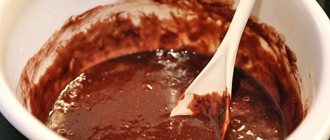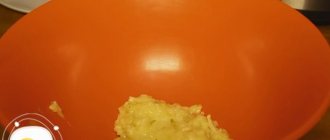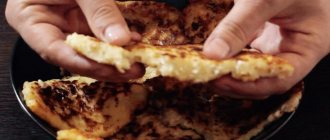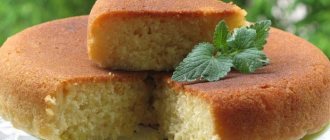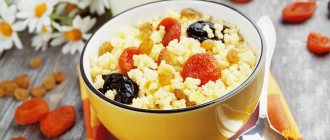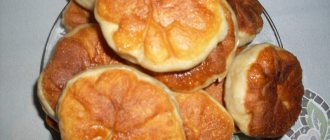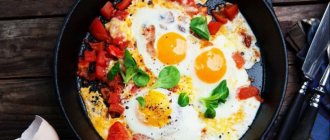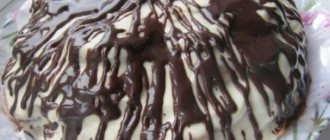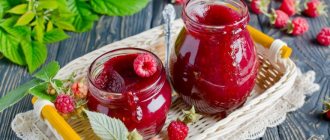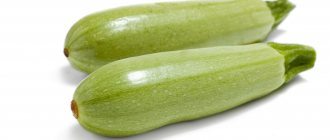PP cupcakes with coconut flour
Such recipes are called basic. You can add anything and get a new interesting taste - grated citrus zest, raisins and finely chopped dried fruits, fresh berries, pieces of fruit. You don’t even have to add sakhzam, then mushrooms, meat, and vegetables (chopped and pre-prepared, of course) are suitable additions. Just don’t forget to take into account additives when calculating KBJU. In this form, as in the recipe, the calorie content and balance of BJU are suitable not only for breakfast, lunch, dinner, but also for an afternoon snack. 4 muffins are a complete breakfast or lunch, 2 muffins are an excellent snack.
Nutritional value per 100 g:
- Calories: 189,3
- Proteins: 14,7
- Fats 8,9
- Carbohydrates: 13,2
Calorie content of the entire serving - 407 kcal
For one serving (4 pcs.):
- coconut flour - 40 g
- cottage cheese - 100 g
- eggs - 1 pc.
- Ryazhenka – 50 ml
- soda - ⅓ tsp.
- salt - a pinch
- sahzam - to taste (I use erythritol 4 tsp)
Step-by-step preparation:
We prepare all products.
Mix the egg, cottage cheese and coconut flour with a regular fork.
Pour in the fermented baked milk, add sakhzam, salt and baking powder, mix. Let it all stand for 15 minutes. During this time, the coconut flour will swell and the cottage cheese will “melt” (soda for cottage cheese is a melting agent; it is used to make homemade processed cheeses from cottage cheese).
Now put the dough into the molds. The photo shows molds made of foil, but I advise you to use silicone ones so that the dough does not stick.
Bake for 35 minutes at 170 degrees. The dough will rise first, then settle slightly. Cool the finished muffins and serve.
Here is such a beautiful and tasty cut cupcake. Absolutely gluten free!
Chocolate banana cupcakes in a mug
The combination of chocolate and banana is always successful, no matter what you cook. Supplemented with a subtle coconut aroma, it becomes simply magical! I can’t even believe that these baked goods are dietary. In addition to coconut flour, the composition also contains rice flour - it is this that gives elasticity to cupcakes/muffins and “holds the cap.” You shouldn’t eat it after lunch, but before 3 p.m. it’s fire!
KBJU per 100 g: 154.6/8.6/4.9/21.2 Calorie content of the entire serving - 425.2 kcal
Needed for 1 serving:
- 40 g coconut flour
- 20 g rice flour
- 1 small chicken egg (half a large one)
- 60 g banana
- 60 g cottage cheese
- 50 ml. milk
- sahzam - to taste
- baking powder - a third of a teaspoon
- a pinch of salt
- 1 tsp with a slide of cocoa.
How to cook:
- In a blender, beat everything except baking powder. You should get a thick, homogeneous mass. Thicker than classic pancake batter, but not standard muffin batter—it doesn’t hold its shape.
- Let it sit for 15 minutes. Then add baking powder and beat again. I baked these cupcakes in ceramic mugs - I just put the dough into suitable cups, since the molds were all full.
- Bake for 35 minutes at 170 degrees. Take it out after the cupcakes have cooled.
Coconut cake recipe. Calorie, chemical composition and nutritional value.
Nutritional value and chemical composition of Coconut Cake.
The table shows the nutritional content (calories, proteins, fats, carbohydrates, vitamins and minerals) per 100 grams of edible portion.
| Nutrient | Quantity | Norm** | % of the norm in 100 g | % of the norm in 100 kcal | 100% normal |
| Calorie content | 296 kcal | 1684 kcal | 17.6% | 5.9% | 569 g |
| Squirrels | 5.9 g | 76 g | 7.8% | 2.6% | 1288 g |
| Fats | 12.9 g | 56 g | 23% | 7.8% | 434 g |
| Carbohydrates | 39.7 g | 219 g | 18.1% | 6.1% | 552 g |
| Alimentary fiber | 2.2 g | 20 g | 11% | 3.7% | 909 g |
| Water | 40.9 g | 2273 g | 1.8% | 0.6% | 5557 g |
| Ash | 1.093 g | ~ | |||
| Vitamins | |||||
| Vitamin A, RE | 55.7 mcg | 900 mcg | 6.2% | 2.1% | 1616 g |
| Retinol | 0.06 mg | ~ | |||
| beta carotene | 0.013 mg | 5 mg | 0.3% | 0.1% | 38462 g |
| Vitamin B1, thiamine | 0.056 mg | 1.5 mg | 3.7% | 1.3% | 2679 g |
| Vitamin B2, riboflavin | 0.115 mg | 1.8 mg | 6.4% | 2.2% | 1565 g |
| Vitamin B4, choline | 69.08 mg | 500 mg | 13.8% | 4.7% | 724 g |
| Vitamin B5, pantothenic | 0.453 mg | 5 mg | 9.1% | 3.1% | 1104 g |
| Vitamin B6, pyridoxine | 0.074 mg | 2 mg | 3.7% | 1.3% | 2703 g |
| Vitamin B9, folates | 11.518 mcg | 400 mcg | 2.9% | 1% | 3473 g |
| Vitamin B12, cobalamin | 0.119 mcg | 3 mcg | 4% | 1.4% | 2521 g |
| Vitamin C, ascorbic acid | 0.77 mg | 90 mg | 0.9% | 0.3% | 11688 g |
| Vitamin D, calciferol | 0.482 mcg | 10 mcg | 4.8% | 1.6% | 2075 g |
| Vitamin E, alpha tocopherol, TE | 0.464 mg | 15 mg | 3.1% | 1% | 3233 g |
| gamma tocopherol | 0.092 mg | ~ | |||
| Vitamin H, biotin | 4.992 mcg | 50 mcg | 10% | 3.4% | 1002 g |
| Vitamin K, phylloquinone | 0.2 mcg | 120 mcg | 0.2% | 0.1% | 60000 g |
| Vitamin RR, NE | 1.539 mg | 20 mg | 7.7% | 2.6% | 1300 g |
| Niacin | 0.281 mg | ~ | |||
| Betaine | 0.009 mg | ~ | |||
| Macronutrients | |||||
| Potassium, K | 248.7 mg | 2500 mg | 9.9% | 3.3% | 1005 g |
| Calcium, Ca | 62.12 mg | 1000 mg | 6.2% | 2.1% | 1610 g |
| Silicon, Si | 0.754 mg | 30 mg | 2.5% | 0.8% | 3979 g |
| Magnesium, Mg | 21.71 mg | 400 mg | 5.4% | 1.8% | 1842 |
| Sodium, Na | 41.78 mg | 1300 mg | 3.2% | 1.1% | 3112 g |
| Sera, S | 63.38 mg | 1000 mg | 6.3% | 2.1% | 1578 g |
| Phosphorus, Ph | 152 mg | 800 mg | 19% | 6.4% | 526 g |
| Chlorine, Cl | 40.9 mg | 2300 mg | 1.8% | 0.6% | 5623 g |
| Microelements | |||||
| Aluminium, Al | 197.9 mcg | ~ | |||
| Bor, B | 7 mcg | ~ | |||
| Vanadium, V | 16.96 mcg | ~ | |||
| Iron, Fe | 2.081 mg | 18 mg | 11.6% | 3.9% | 865 g |
| Yod, I | 4.22 mcg | 150 mcg | 2.8% | 0.9% | 3555 g |
| Cobalt, Co | 2.685 mcg | 10 mcg | 26.9% | 9.1% | 372 g |
| Manganese, Mn | 0.5379 mg | 2 mg | 26.9% | 9.1% | 372 g |
| Copper, Cu | 163.56 mcg | 1000 mcg | 16.4% | 5.5% | 611 g |
| Molybdenum, Mo | 3.784 mcg | 70 mcg | 5.4% | 1.8% | 1850 g |
| Nickel, Ni | 0.415 mcg | ~ | |||
| Tin, Sn | 0.98 mcg | ~ | |||
| Selenium, Se | 9.683 mcg | 55 mcg | 17.6% | 5.9% | 568 g |
| Titanium, Ti | 2.07 mcg | ~ | |||
| Fluorine, F | 17.24 mcg | 4000 mcg | 0.4% | 0.1% | 23202 g |
| Chromium, Cr | 1.37 mcg | 50 mcg | 2.7% | 0.9% | 3650 g |
| Zinc, Zn | 0.7103 mg | 12 mg | 5.9% | 2% | 1689 g |
| Digestible carbohydrates | |||||
| Starch and dextrins | 12.796 g | ~ | |||
| Mono- and disaccharides (sugars) | 25.7 g | max 100 g | |||
| Glucose (dextrose) | 0.116 g | ~ | |||
| Sucrose | 8.122 g | ~ | |||
| Fructose | 0.095 g | ~ | |||
| Essential amino acids | |||||
| Arginine* | 0.35 g | ~ | |||
| Valin | 0.243 g | ~ | |||
| Histidine* | 0.104 g | ~ | |||
| Isoleucine | 0.181 g | ~ | |||
| Leucine | 0.33 g | ~ | |||
| Lysine | 0.258 g | ~ | |||
| Methionine | 0.118 g | ~ | |||
| Methionine + Cysteine | 0.171 g | ~ | |||
| Threonine | 0.181 g | ~ | |||
| Tryptophan | 0.059 g | ~ | |||
| Phenylalanine | 0.205 g | ~ | |||
| Phenylalanine+Tyrosine | 0.269 g | ~ | |||
| Nonessential amino acids | |||||
| Alanin | 0.219 g | ~ | |||
| Aspartic acid | 0.389 g | ~ | |||
| Glycine | 0.147 g | ~ | |||
| Glutamic acid | 0.647 g | ~ | |||
| Proline | 0.136 g | ~ | |||
| Serin | 0.272 g | ~ | |||
| Tyrosine | 0.145 g | ~ | |||
| Cysteine | 0.089 g | ~ | |||
| Sterols (sterols) | |||||
| Cholesterol | 124.83 mg | max 300 mg | |||
| Phytosterols | 8.131 mg | ~ | |||
| Saturated fatty acids | |||||
| Saturated fatty acids | 9.7 g | max 18.7 g | |||
| 6:0 Kapronovaya | 0.058 g | ~ | |||
| 8:0 Caprylic | 0.708 g | ~ | |||
| 10:0 Kaprinovaya | 0.563 g | ~ | |||
| 12:0 Lauric | 4.486 g | ~ | |||
| 14:0 Miristinovaya | 1.781 g | ~ | |||
| 15:0 Pentadecane | 0.002 g | ~ | |||
| 16:0 Palmitinaya | 1.346 g | ~ | |||
| 17:0 Margarine | 0.007 g | ~ | |||
| 18:0 Stearic | 0.733 g | ~ | |||
| 20:0 Arakhinovaya | 0.007 g | ~ | |||
| Monounsaturated fatty acids | 1.519 g | min 16.8 g | 9% | 3% | |
| 16:1 Palmitoleic | 0.093 g | ~ | |||
| 17:1 Heptadecene | 0.002 g | ~ | |||
| 18:1 Oleic (omega-9) | 1.404 g | ~ | |||
| 20:1 Gadoleic (omega-9) | 0.01 g | ~ | |||
| Polyunsaturated fatty acids | 0.387 g | from 11.2 to 20.6 g | 3.5% | 1.2% | |
| 18:2 Linolevaya | 0.373 g | ~ | |||
| 18:3 Linolenic | 0.014 g | ~ | |||
| 20:4 Arachidonic | 0.024 g | ~ | |||
| Omega-6 fatty acids | 0.6 g | from 4.7 to 16.8 g | 12.8% | 4.3% |
The energy value of Coconut Cake is 296 kcal.
Primary Source: Created in the application by the user. Read more.
** This table shows the average levels of vitamins and minerals for an adult. If you want to know the norms taking into account your gender, age and other factors, then use the “My Healthy Diet” application.
Diet muffins without eggs
Since we also have vegetarians at home, in addition to PP people, we made muffins with coconut flour without eggs. It turned out very well. They are also chocolate, and instead of eggs they use banana and flaxseed flour.
KBJU per 100 g: 197.6/10.7/5.9/26 Calorie content of the entire serving - 286.5 kcal
Products for 1 serving:
- 40 g coconut flour
- 20 g flaxseed flour
- half a banana
- 40 ml kefir
- 1 tsp cocoa powder
- baking powder - ⅓ tsp.
- salt - a pinch
- sahzam - to taste
Cooking method:
- Mix everything in a bowl except baking powder. It is better to mash the banana with a fork before doing this. The dough may turn out too thick - add a couple of tablespoons of water.
- After the dough has stood for 15 minutes, add sweetener, mix and place everything in the molds.
- Bake in the oven for 30-40 minutes at 170 degrees. Delicious served with fruits and berries.
Step-by-step cooking recipe
Step 1
Preheat the oven to 180°C. In a medium bowl, add flour, baking powder, baking soda, salt and coconut and mix well.
Step 2
Place the egg in a large bowl, beat lightly with a whisk, add sugar, pour in vegetable oil and kefir, add lemon zest, stir.
Advice . To enhance the lemon flavor of the muffins, you can grind some of the sugar with the lemon zest, which should be freshly grated.
Advice. It is necessary to use refined, deodorized vegetable oil to prevent the appearance of foreign odors and tastes in baked goods.
Step 3
Gradually add the flour mixture into the resulting egg-kefir mixture and mix thoroughly.
Step 4
Grease a 6-piece muffin tin with a diameter of 7 cm. Fill the prepared pan evenly with batter, filling each cavity no more than three-quarters full.
Step 5
Bake in the middle of a preheated oven at 180°C for 20-25 minutes until golden brown.
Advice. How to preheat the oven, how to prepare the oven for baking and other useful tips, read our article.
Step 6
Leave the finished cupcakes in the pan for 5 minutes. Remove from pan and let cool completely on a wire rack.
Advice . How to check if a cake is ready? To check if the cake is ready, you just need to take a wooden skewer or toothpick and stick it into the center of the cake. The cake is ready when the toothpick comes out clean.
Advice . The muffins are best consumed the day they are made, but can also be stored in an airtight container at room temperature or in the refrigerator for up to 3 days.
Step 7
Pour powdered sugar into a small bowl, add lemon juice, mix thoroughly until smooth.
Advice. If the glaze is too thick, add a little more lemon juice; if it’s too thin, add powdered sugar.
Advice . Icing sugar must be used immediately as it hardens very quickly.
Step 8
Drizzle the cooled cupcakes with thick lemon glaze and sprinkle with coconut flakes.
Advice. It's best to frost the cupcakes on a wire rack to allow excess frosting to drip off.
Step 9
Serve the finished muffins for tea. Bon appetit!
Final tips
Each manufacturer has its own special coconut flour. I haven’t figured out what it’s all about yet, but I like this one (it’s from Iherb). This is the flour I used for these recipes. It is white, not crumbly, very finely ground and has a delicate, unobtrusive coconut aroma.
If you want a drier dough consistency, mix coconut flour with other healthy flours, but if it’s more moist, leave one coconut flour.
Irina Polyanitsa My name is Irina, I am the owner and admin of the site, as well as the author of most of the recipes and articles. I love to cook simple and healthy delicacies. Certified gym instructor, personal trainer. She completed a course on nutrition and health at Stanford University, Stanford Introduction to Food and Health, as well as a course at Ludwig Maximilian University of Munich (LMU) Nutrition and Lifestyle in Pregnancy (about nutrition and lifestyle during pregnancy).
